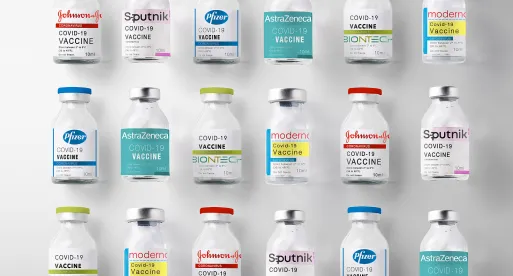The nationwide rollout of the COVID-19 vaccine has continued to gain momentum some five months after the shot first became available to limited populations. In all 50 states, everyone above the age of 16 is either already eligible to receive the shot, or will become eligible shortly. On April 3rd, more than 4 million people in the U.S. received a vaccine, the highest one-day number to date. And the country seems on track to hit President Biden’s new goal of 200 million shots in his first 100 days in office which is April 30.
Despite all of this good news, there have been setbacks – the most serious of which was reported in early April. The New York Times revealed that Emergent BioSolutions, a biotech firm with a 628 million dollar contract with the federal government to manufacture COVID-19 vaccines, had to destroy up to 15 million doses of Johnson & Johnson’s Jenssen COVID-19 vaccine during the first week in April, after it was discovered the vaccine had been contaminated. That was not the first problem Emergent had with vaccine production. Between October 2020 and January 2021, the company also had to throw out between 10 and 15 million doses of the AstraZenaca vaccine because of contamination or suspected contamination. In November 2020, production of a batch of the Johnson & Johnson vaccine was discarded because of worker error, and records indicate that workers frequently deviated from manufacturing standards. As of now, federal regulators have yet to clear the Emergent facility, and therefore not a single dose of the 150 million doses it has produced has been distributed for public use.
Audits performed by federal regulators have found serious fundamental issues at the Emergent vaccine manufacturing facility and outside experts say that such recurring issues imply deep quality control problems.
Due to the urgency of the vaccine rollout, whatever the underlying causes of the quality issues at Emergent, given the huge amounts of money being awarded in the form of government contracts, there is potential for fraud and abuse in the manufacture of vaccines. Workers at Emergent and other manufacturing sites are in the best position to identify such issues, and should feel free to report safety and financial improprieties without fear of reprisal. Such whistleblowers who report abuse have various legal protections.
Protections for Pharmaceutical Whistleblowers
While there is no federal legislation that provides blanket protection for whistleblowers in the pharmaceutical industry from retaliation, there is a patchwork of federal and state laws that may do so, depending on the facts of the matter.
False Claims Act
For government contractors in the pharmaceutical industry, the False Claims Act (FCA) may be a practical approach to blowing the whistle. The FCA prohibits the intentional presentation of false claims to the government for payment, and that includes providing false information in connection with any claim for payment.
If a pharmaceutical whistleblower discovered a violation of the FCA – for example, a company fraudulently inflating its claims to government health insurance companies – he or she could file a qui tam lawsuit. Qui tam lawsuits are brought by individuals on behalf of the government. Whistleblowers are entitled to between 15% and 30% of any settlement or judgment won by the government.
Additionally, the FCA includes an anti-retaliation provision, which prohibits retaliation against individuals who undertake “lawful acts . . . in furtherance of” a qui tam action or “other efforts to stop one or more violations” of the FCA.
State Laws Protecting Whistleblowers
Several states have adopted their own state-level versions of the False Claims Act. While modeled after the federal FCA, many state statutes have slightly different requirements, and whistleblowers should consult an experienced qui tam lawyer to navigate these complex laws.
Additionally, many states have statutes protecting employees from “wrongful termination in violation of public policy.” This may protect employees from retaliation if they refuse to participate in illegal conduct or conduct that otherwise is harmful to the public interest.
Whistleblower Protection Act
The Whistleblower Protection Act (WPA) was passed in 1989 with the expressed intention to “strengthen and improve protection for the rights of Federal employees, to prevent reprisals, and to help eliminate wrongdoing within the Government.”
While the WPA does not cover employees of private companies, it does protect employees in the executive branch from retaliation if the covered employee reports information that they reasonably believe constitutes “a violation of any law, rule, or regulation” or evidences “gross mismanagement, a gross waste of funds, an abuse of authority, or a substantial and specific danger to public health or safety.”
Should a federal employee prove they were subjected to illegal retaliation, they would be entitled to remedies the may include injunctive relief; reinstatement with previous seniority and benefits; back pay with interest; and compensatory damages, including compensation for reasonable attorney’s fees.
Conclusion
The vaccines that are being given to the public have been thoroughly tested, and people should be confident in their safety and efficacy. The science behind the vaccines is sound, and serious side effects have been few and far between. But we have already seen bad practices in laboratories that will not only waste millions of dollars, but will significantly delay the rollout of the vaccine, and the return to normal daily life.
Pharmaceutical employees, or government employees involved in the production and distribution of the COVID-19 vaccine, who believe that they have witnessed fraud or quality control issues, should contact an experienced employment attorney to be sure they have legal protection if and when they decide to blow the whistle.



 />i
/>i

